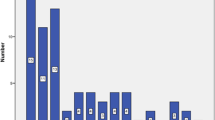Abstract
Dr. O.P. Yadava, CEO & Chief Cardiac Surgeon, National Heart Institute, New Delhi, India, and Editor-in-Chief, Indian Journal of Thoracic and Cardiovascular Surgery, is in conversation with Dr. Philippe Kolh, Leige, Belgium, on Relevance of Guidelines. Dr. Kolh opined that though most recommendations may not be of level “A” yet, they are relevant and meaningful in optimum delivery of medicare.
Similar content being viewed by others
Prof. Kolh feels that guidelines are very important in that they summarize knowledge on best evidence base available. When faced with a provocative question from Dr. Yadava quoting a recent article showing that over two thirds of recommendations in guidelines was either not evidence based, or based on low level of evidence “B” or “C” [1], Prof. Kolh agreed that only 25–35% of recommendations were level “A.” He however stressed that Level “C” recommendations are also relevant, as they are from scientific experts in the field. Playing the devil’s advocate Dr. Yadava asked, as most of the members of the writing committee of guidelines have industry contacts, does it not bring in conflicts of interest? Prof Kolh disagreed and commented that most conflicts are reviewed by the Chair of the writing committee and as experts are involved in multiple companies on varied subjects, they usually tend to give balanced statements and conflicts are not a major issue. Prof. Kolh opined that guidelines do not stifle innovation and are revised at regular intervals to keep up with new knowledge. He stresses on the fact that if we go by guideline-directed management protocols, results are optimum [2]. He is a big votary for Registry data as they look at “All Comers” and therefore are true representative of the surgical landscape of the country. However, for the registry data to be meaningful, it must have external and internal validation and long-term follow-up must be very stringent.
References
Fanaroff AC, Califf RM, Windecker S, Smith SC, Lopes RD. Levels of evidence supporting American College of Cardiology/American Heart Association and European Society of Cardiology guidelines, 2008-2018. JAMA. 2019;321:1069–80.
Bonow RO, Braunwald E. The evidence supporting cardiovascular guidelines: is there evidence of progress in the last decade? JAMA. 2019;321:1053–4.
Author information
Authors and Affiliations
Corresponding author
Additional information
Publisher’s note
Springer Nature remains neutral with regard to jurisdictional claims in published maps and institutional affiliations.
Electronic supplementary material
(MP4 26085 kb)
Rights and permissions
About this article
Cite this article
Yadava, O.P., Kolh, P. Relevance of Guidelines. Indian J Thorac Cardiovasc Surg 36, 431 (2020). https://doi.org/10.1007/s12055-020-00980-7
Published:
Issue Date:
DOI: https://doi.org/10.1007/s12055-020-00980-7




